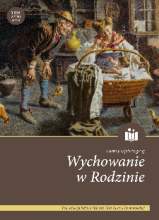Warunki życia warszawskich rodzin robotniczych w II Rzeczypospolitej jako determinanty socjalizacji i wychowania młodego pokolenia
Living conditions of Warsaw working families in the Second Polish Republic as determinants of socialization
and the upbringing of the young generation
Author(s): Małgorzata Maria KrakowiakSubject(s): History, Social Sciences, Education, Sociology, Social history
Published by: Zakład Historii Edukacji w Instytucie Pedagogiki Uniwersytetu Wrocławskiego
Keywords: Warsaw; family; youth; education; socialization; living conditions; Second Polish-Republic
Summary/Abstract: Aim: The article is devoted to the problems of existence of Warsaw working families during the inter-war period. The aim of this content is showing the living conditions and their impact on the processes of socialization and the raising of the young generation of the proletariat. The analyzed material comes from surveys conducted by the Institute of Social Economy describing the situation in the capital in the 1920s and 1930s. The collected data concentrates on issues related to the socio-economic situations of Warsaw residents. From the discussed problems of the family’s functioning, those problems directly influencing the upbringing and socialization of the youngest were selected. The most important ones are: the housing situation, nutritional problems, hygiene conditions, education, socio-cultural life and employment at a young age. Methods: The analysis of the acquired materials used the microhistorical research method, applied in relation to family history. Results: As a result of the analysis it was found that the situation of capital residents in the inter-war period was difficult. The transmission of norms and values inworking-class families was determined by the conditions of existence. The material status of the family influenced their living situation: poor housing conditions and insufficient resources to provide food were the everyday life of the majority of working class families. Conclusions: The analysis of source materials leads to the conclusions that:— low awareness of hygiene contributed to the spread of diseases in this environment.— despite the general schooling obligation, a large proportion of Warsaw children and young people did not attend school and, as a result, illiteracy grew.— the bad economic situation increased the need to work from a very young age, which was another problem which brought social consequences.
Journal: Wychowanie w Rodzinie
- Issue Year: XVIII/2018
- Issue No: 2
- Page Range: 137-154
- Page Count: 18
- Language: English, Polish

